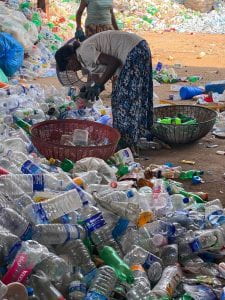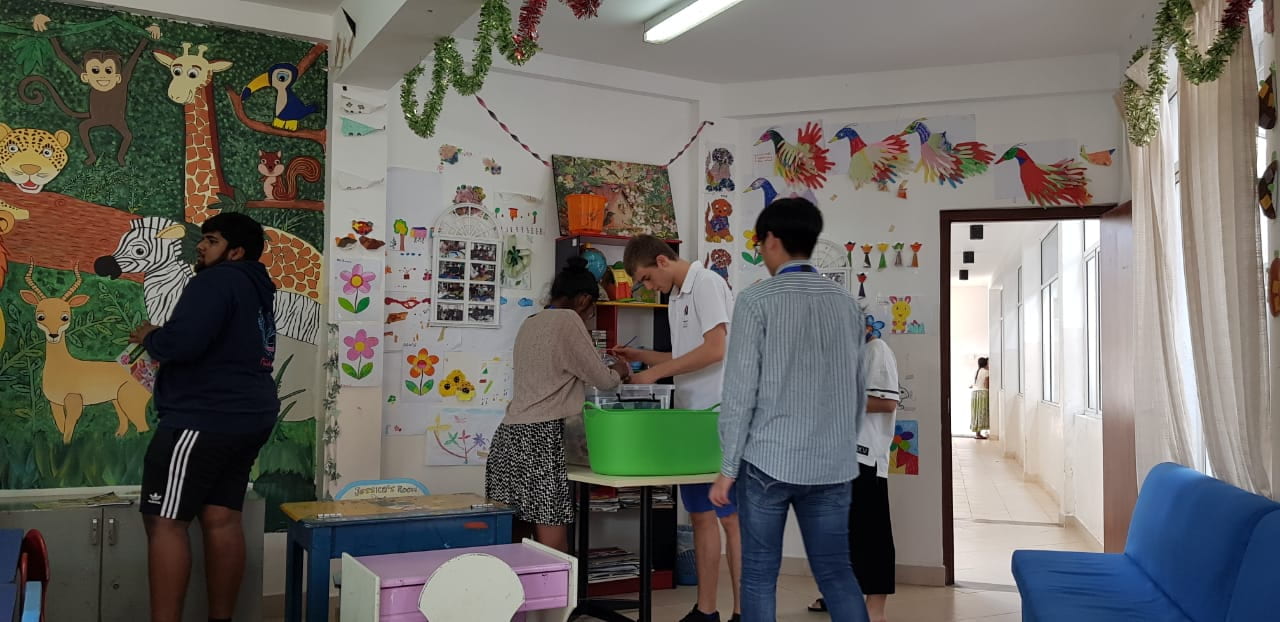The gates open and the bus crawls in. Immediately we are surrounded by an ocean of glistening plastic. Waves of bottles, buckets, and containers roll in. We are greeted by Mr. Nimal who leads us into a large hall. Struck by waves of heat and loud, ear wrenching noises the place feels compressed, the mounds of plastic seem to cave in, suffocating. A few women stand near a pile of soda bottles, folded over, sorting out an army of plastic, the piles seem to go on forever.
Viridis is a private recycling company located in Panagoda Sri Lanka. The center is one of the largest on the island and offers a multitude of services which include PET bottle recycling, electronic waste management, polythene and plastic recycling, and industrial waste management. (for more information on the services conducted by the company please visit the Viridis website)
The Viridis factory addresses a major global issue at hand that is: dealing with the growing forest of plastic we produce as a population. As the world resorts to collecting solid waste and disposing of it in landfills an array of problems emerge. Studies have shown that aging plastics release high levels of Ethylene and Methane: two problematic greenhouses gases. Some may see burning as a solution but that solution releases multitudes of hazardous halogens and dioxins which degrade the Earth’s atmosphere.
Recycling is one of the most widely accepted solutions put into play when it comes to dealing with plastic waste. The Viridis plant implements this solution in their factory taking in post-consumer(eg.used plastic soda bottles) and post-industrial waste (eg.damaged broom fibers) and recycling it to produce chips of recycled plastic which can be then sold in bulk to manufacturing companies.
As Mr. Nimal walks us through the factory he speaks to us about the economics behind the production process. He explains that recycling centers are constantly competing with virgin plastic production. The price of Virgin plastic which is essentially resin produced directly from Petrochemical feedstock fluctuates according to the price of petroleum meaning that higher petroleum prices would actually increase the Viridis company’s profit margin. Mr. Nimal speaks of how the relatively cheap price of virgin plastic drastically decreases the company’s profit. He also presents another issue which lowers their profit margins, a flaw in Sri Lanka’s environmental policy. Unlike in most countries, multinational companies that set up factories here are not bound to take responsibility for their plastic waste. Waste that enters the recycling center is transported by the Viridis company itself which increases their cost of production. He proposes that large manufacturing industries should be legally bound to transport the post-consumer and post-industrial waste they produce to a recycling center which would aid the recycling company significantly.
The recycling process is definitely an extensive one. Starting with an enormous pile of unsorted plastic workers categorize each item based on color and plastic’s chemical composition. Examples of plastic types include PET, PP, PVC, and PE-HD. Afterward the plastic is sorted with bottle caps and labels removed it is sent through a shredder which cuts up the plastic into tiny chips. The chips are then put through several stages of washing and the cleaned plastic is then dried in large ovens. Afterword the chips are sorted and packaged to be sold in bulk to manufacturing companies.

Recycling is a presentable solution to the world’s plastic problems however, as with all solutions it has its faults. The recycling process consumes a high amount of energy and since the majority of Sri Lanka’s power supply is obtained from coal combustion the factory, in turn, produces a high quantity of CO2 emissions. Further, as mentioned previously the factories release high amounts of heat and, toxic emissions from the plastic placed high-temperature ovens which could potentially be hazardous to the employees in the factory. However, recycling has its benefits that is the reduction of the potential stress on petroleum resources. It also reduces the amount of virgin plastic being used around the globe which means that less plastic is being added to the global market. However, in the long run recycling is not a plausible solution. Other solutions such a reducing and reusing plastic are essential in the prevention and reduction of plastic pollution. In our struggle to control the mountains of plastic we create, reducing our plastic intake is the only way forward; by eliminating the problem which is the overuse of plastic resources we cancel out the need to recycle in the first place thereby saving energy and consequently saving our planet.




Leave a Reply